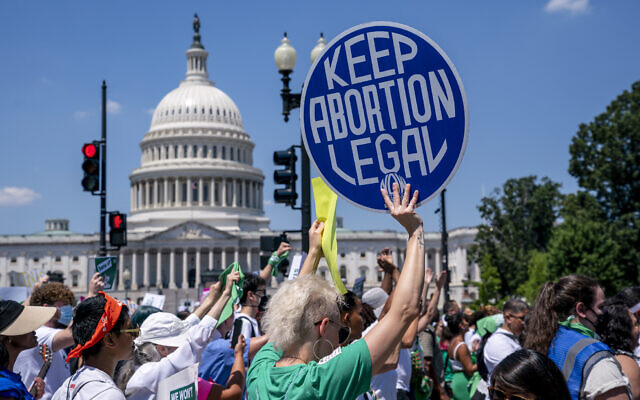WASHINGTON — Going into November’s US election, neither Vice President Kamala Harris nor former president Donald Trump has a decisive edge with the public on the economy, turning an issue that was once a clear strength for Trump into the equivalent of a political jump ball.
About four in 10 registered voters say Republican Trump would do a better job handling the economy, while a similar number say that about the Democratic vice president, according to a new poll by The Associated Press-NORC Center for Public Affairs Research. About one in 10 voters don’t trust either candidate, and a similar share has equal faith in them.
The finding is a warning sign for Trump, who has tried to link Harris to US President Joe Biden’s economic track record. The new poll suggests that Harris may be escaping some of the president’s baggage on the issue, undercutting what was previously one of Trump’s major advantages.
The economy has long been a weak issue for Biden: A separate AP-NORC poll conducted in late June, before Biden’s disastrous debate with Trump, found that about six in 10 Americans disapproved of his handling of the economy. Earlier this year, Americans were much more likely to say that Trump’s presidency helped the country on cost-of-living and job creation, compared to Biden’s.
The new poll found that the economy is one of the most important issues for about eight in 10 voters as they consider which candidate to support, dwarfing other top issues like health care and crime.
Get The Times of Israel’s Daily Edition
by email and never miss our top stories
By signing up, you agree to the terms
The aftermath of inflation’s spike in 2022 to a four-decade high has pervaded this year’s presidential contest. Shoppers are upset over their grocery bills. Higher interest rates are financially squeezing the buyers of homes and motor vehicles. All that has appeared to matter more to the public than the low 4.2 percent unemployment rate and stock market gains.

Traders work on the floor at the New York Stock Exchange in New York, December 29, 2022. (AP/Seth Wenig)
According to the AP-NORC poll, only about one-third of voters say the state of the national economy is somewhat or very good, although they’re more optimistic about their own situation, with about six in 10 voters saying their household’s finances are somewhat or very good. Both of those numbers have remained steady over the course of the year, despite falling inflation.
The candidates have clashing ideas about how best to straighten out the economy, giving voters a stark choice that might hint at how partisan identity increasingly informs views of the economy and policy. But neither campaign has fully explained how its plans would be implemented. Harris insists her plans would be fully funded and not add to the deficit, while Trump’s team assumes — in defiance of most economic models — that growth will be high enough to offset the cost.
Trump suggests growth would come from tax cuts for corporations and the wealthy leading to more investment, while a universal tariff of as much as 20% would direct that investment to building US factories.
Harris has campaigned on more benefits for the middle class to be funded by higher taxes on corporations and the wealthy, saying that would help to contain costs and deliver growth. Her team has warned that Trump’s tariffs would lead to higher prices and worsen underlying inflation challenges.

Abortion-rights activists demonstrate against the US Supreme Court decision to overturn Roe v. Wade that established a constitutional right to abortion, on Capitol Hill in Washington, June 30, 2022. (AP/J. Scott Applewhite)
The economy is one of many issues shaping public sentiment as the campaigns seek to turn out their voters. More than half of voters said health care was a top concern, while roughly half said that about crime, immigration, abortion policy and gun policy. Only about one-third called climate change one of the most important issues for their vote, and about one-quarter said that about the war between Israel and Hamas.
Trump and Harris are evenly matched in the poll on who would better handle crime and the war in Gaza. But the issues soon splinter in ways that reflect the distinct priorities of Republicans and Democrats.
Trump has an advantage over Harris on whom voters trust to better handle immigration. This issue was a problem for Biden, as well: Illegal immigration and crossings at the US border with Mexico have been a challenge during much of his administration. Republicans are more likely to care about immigration, the issue where Trump has a clear upper hand.

US Border Patrol agents speak with migrants seeking asylum, mainly from Colombia, China and Ecuador, in a makeshift, mountainous campsite after crossing the border between Mexico and the United States, Friday, Feb. 2, 2024, near Jacumba, California (AP/Gregory Bull)
Harris fares better than Trump when it comes to issues that Democrats care more about, including gun policy, health care, abortion policy and climate change.
Overall, voters see high stakes for the presidential election’s impact on the country’s future, the economy, and the future of democracy in the US, but they’re less likely to think the election will have an impact on them personally. About 8 in 10 voters say the election will have “a great deal” or “quite a bit” of impact on the country’s future. About three-quarters say the election will have a similar impact on the nation’s economy and the future of democracy in the US.
By contrast, half of voters say the election will have at least “quite a bit” of impact on them personally.
The poll of 1,771 registered voters was conducted September 12-16, 2024, using a sample drawn from NORC’s probability-based AmeriSpeak Panel, which is designed to be representative of the US population. The margin of sampling error for registered voters is plus or minus 3.4 percentage points.
pdcc